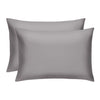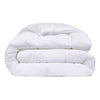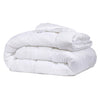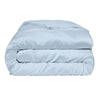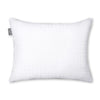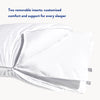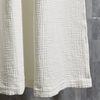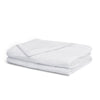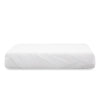The Daily Miracle
10 Methods on How To Fall Asleep Faster
Published
June 15, 2022
Author
Nicholas Crusie

If you aren’t getting enough sleep, a wide variety of sleep-deprived side effects can negatively impact your life. If you’re not getting good sleep, you can struggle with learning, recalling information, and stabilizing your mood (along with some other basic biological functions).
So it’s safe to say that sleep is important. Let’s talk about ten methods to help you fall asleep fast so you can get a good night’s sleep.
1. Get Into a Routine
While you probably had a bedtime as a kid, it’s harder to stick to a regular sleep schedule as an adult. If your sleep patterns are irregular, it can start to mess with your circadian rhythm, which is part of how your body determines it’s time to wind down and get to snoozing.
By ensuring that you can wake up and go to bed around the same time every day, you’ll help your body regulate itself better once it adjusts to your new schedule. Establishing a regular bedtime routine can also go a long way in the self-care department. This good sleep hygiene practice enables you to set aside time to focus on yourself before you go to sleep every night.
2. Lower the Temperature
Everyone’s ideal temperature for their sleep environment can be different. However, studies show that keeping your room on the cooler end of the spectrum can help to improve your quality of sleep.
Sleepy scientists report that somewhere between 60 and 67 degrees Fahrenheit seems to be ideal. Of course, some people are hot sleepers, and some run cold; you may need to adjust the temperature accordingly to find what works best for you.
In addition to adjusting the thermostat, you can make some changes to your bedding to ensure that everything is as breathable as possible, helping to keep your body temperature from running too hot or too cold.
Our Miracle Made Bedding Collection is made with natural silver fibers. Silver is the most thermally conductive metal on earth, which means it conducts heat away from your body and into your environment. Traditional fabrics trap your sweat into your bedding, causing dreamers to overheat.
While other sheets wick sweat away, silver sheets manage sweat before it even begins and creates a cooling effect so that your body does not overheat throughout the night.
3. Exercise
Finding time to work out can be difficult, but one of the many health benefits it can offer is that it may make it easier for you to fall asleep! Physical activity increases the serotonin in your brain, and it has a positive effect on stress hormones that can make it challenging to drift off.
Working out in the morning is more beneficial to your sleep habits. If you prefer to exercise in the evening, choose something less vigorous to get better sleep.
4. Unplug Before Bed
Phones and laptops are an unavoidable part of our daily lives. If you find that any trace of
Sleepiness dissipates the moment you settle in to read something on your phone before bed; blue light might be the culprit.
Blue light can affect our ability to sleep by interfering with melatonin production. Light exposure, particularly bright light, can delay sleep onset. Unplugging at least an hour before you want to sleep can address many sleep problems.
5. Upgrade Your Bedding
On average, you’ll want seven to eight hours of sleep per night to feel well-rested the next day. When you add that up over your lifetime, you spend a lot of it in bed! So it’s worth investing a bit in your bedding to ensure that time is well spent.
Our Miracle Sheet Set and Pillow Cases can promote thermoregulation to help you stay cool and comfortable while you sleep. They’re also made with antimicrobial silver, which prevents bacteria from gathering on your sheets. This is good for your sleep hygiene, which promotes healthy sleep.
6. Take Time To Unwind
Your favorite way to unwind is personal. Some favorite ways to chill include deep breathing or other relaxation techniques. These can help you chill out after a busy day and prepare your body for sleep time.
If breathing exercises aren’t for you, you can look into techniques like visualization or even progressive muscle relaxation. Many enjoy mindfulness meditation, aromatherapy, or soothing music.
7. Cut Back on Caffeine
Coffee is one of our favorite ways to start the day, too. However, cutting back on the amount of caffeine you drink in a day can have a positive effect on the quality of your sleep.
Especially if you consume caffeine later in the day, it can make it tricky to get to sleep when the time comes. Try swapping out high caffeine options like black tea for something soothing, like chamomile.
8. Plan for an Early Dinner
While you don’t have to think about digesting your food, your body does! Eating too close to bedtime can make it difficult for your body to fully relax in the way it needs to to get that full eight hours of restful sleep. Try moving dinner time up to at least four hours before bedtime.
9. Shower Before You Sleep
Everyone is a bit different when it comes to when and how often they like to shower. While a morning shower may be your go-to for helping to perk yourself up, taking a hot bath or shower before bed may help you sleep faster, meaning you wake up more well-rested.
Some studies have shown that taking a shower or bath in water between 104 and 108 degrees Fahrenheit can positively impact your sleep quality. Not only that but a warm bath or shower can help you get to sleep faster.
Why? It’s believed that warm water can stimulate blood flow. This allows body heat to escape more quickly, which can promote a more optimal core temperature while you’re trying to fall asleep.
10. Try To Stay Awake
We know what you’re thinking — this is the opposite of what you’re trying to do! That’s actually part of why it may work so well. If you’re desperate to drift off, you may lay in bed thinking of nothing but trying to fall asleep, which can cause stress. Unfortunately, this stress may make it even harder for you to fall asleep.
Some studies have shown that if you instead try to keep yourself awake come bedtime, you may more easily be able to relax and, ironically, fall asleep faster. If you find yourself tossing and turning for hours after you lay down, it might be better to just go with it. Get up, read a book, have some (non-caffeinated) tea, or do other low-key tasks until your body naturally gets tired and you can drift off to sleep stress-free.
The Best Bedtime
It’s hard to pinpoint exactly when it happens, but at some point in growing up, we all go from dreading naptime to loving any opportunity to get a little extra shut-eye. Even if you love the feeling of a full, restful night’s sleep and know it’s good for you, many things out there can make it hard for you to fall asleep.
Luckily, with the right bedding and healthy sleep practices, falling into bed can be the cherry on top of the perfect day.
Sources:


